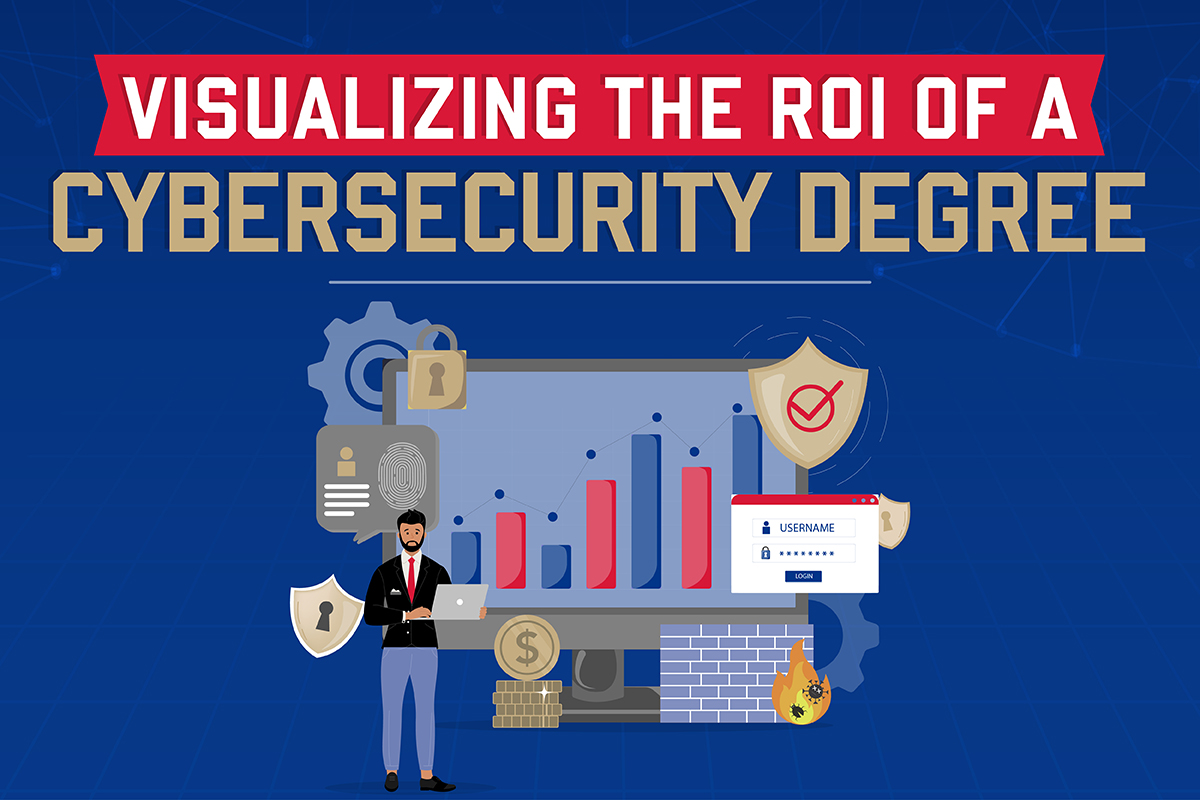How to Become an Ethical Hacker
Written by:
University of Tulsa
• Sep 26, 2024

The nation’s need for qualified cybersecurity professionals was described as “desperate” in a 2024 White House brief, with a workforce gap of half a million positions. Both the 2022 Cybersecurity Workforce Study and Cyberseek’s data on job openings in cybersecurity confirm that number, with estimates of a gap of between 400,000 and 500,000 workers.
Clearly, the cybersecurity field has opportunities available for people in the early or mid-career stages who are interested in technology. How though can individuals break into the industry? One path is ethical hacking. With the right training and education, cyber professionals with a background in ethical hacking can be equipped for many different roles in the industry.
What Is an Ethical Hacker?
The term “hacker” is generally associated with someone who has advanced technical skills and malicious intent. Hackers typically break through an individual’s or an organization’s digital defenses to access sensitive data or manipulate financial accounts to steal money.
On the other hand, an ethical hacker is someone who is equally technically skilled but who works with organizations (and sometimes individuals) for the purpose of pressure testing network security. The main goal of an ethical hacker is to identify network vulnerabilities, advising on crucial steps to take to make the network more secure.
Steps to Becoming an Ethical Hacker
The right education, certifications, and on-the-job training are essential to becoming an ethical hacker, as they teach the fundamentals of the craft and prepare professionals for long and rewarding careers in cybersecurity.
Earn a Cybersecurity Degree
While employers don’t usually require a specific degree, a bachelor’s degree in cybersecurity or a related field can make candidates more competitive in the market and help them pass certification exams. Beyond an undergraduate degree, aspiring ethical hackers may also wonder whether a master’s degree in cybersecurity is worth it.
Advanced degrees set professionals up for team leadership opportunities and strategic decision-making about how to best secure an organization’s networks or manage attempted attacks. Plus, industries outside of technology, such as government, finance, health care, retail, and education — which have great need for cybersecurity — value higher education as a marker for advancement.
A master’s degree signals not only expertise in the field but also a broader understanding of:
- Best practices and essential principles
- Team leadership
- Human factors in cybersecurity
- Management principles for complex projects
Furthermore, a master’s degree can lead to higher salaries. According to Payscale, the median annual salary for professionals holding a master’s degree in cybersecurity was about $96,000 as of March 2024 — versus about $77,000 for those with a bachelor’s degree in the same field as of June 2024.
Gain Required Skills
Education is also an ideal way to gain necessary skills. As you consider becoming an ethical hacker, think of education and certification exams as a guide to which skills are the most essential and relevant. They include the following:
- Programming and Coding: Reading and writing computer coding languages, such as Python, JavaScript, and PHP
- Threat Analysis: Conducting penetration testing on networks and using intrusion detection software
- Network Security Design
- Software: Penetrating firewalls, virtual private networks (VPNs), and operating systems
- Hardware: Cracking encryption and securing devices
- Cryptography: Embedding additional security into code
- Engineering Knowledge: Understanding of how computers and networks operate
There’s a lot to learn about cybersecurity, which is why a curriculum that breaks down each fundamental topic of ethical hacking empowers aspiring professionals to new heights.
Earn Relevant Certifications
With a degree in hand, cybersecurity professionals — those just entering the field as well as those seeking advancement — almost always seek certifications. The most relevant certifications can vary depending on the industry and role, but generally include the following:
- Certified Information Systems Security Professional (CISSP)
- CompTIA Security+
- Offensive Security Certified Professional (OSCP/PEN-200)
Certifications validate technical skills. They can help make candidates more competitive in the cybersecurity job market since employers value them as proof of proficiency.
Pursue a Field of Cybersecurity
Cybersecurity is a broad field with many subfields, and knowing them can help chart a professional path.
- Network Testing: Ethical hackers often work in network testing, doing internal audits, threat analysis, and simulating cyber attacks.
- Incident Response: Some cybersecurity professionals focus on patching networks and managing collateral damage when an attack does happen. An understanding of hacking plays a major role in this role.
- Engineering: Network engineers build better tools and systems for increased security.
- Management: At the highest level, cybersecurity managers and officers focus on strategic goal setting, decision-making, and team leadership.
Job Outlook and Salary for Ethical Hackers
Ethical hacking is a set of skills that can lead to many career pathways in cybersecurity. The U.S. Bureau of Labor and Statistics (BLS) anticipates 33% job growth between 2023 and 2033 for information security analysts, an entry-level role that describes professionals who “plan and carry out security measures to protect an organization’s computer networks and systems.” The median annual pay for these professionals was $120,360 in 2023.
Other common titles for ethical hackers include the following, with a master’s degree often making candidates more competitive for the higher level cybersecurity careers:
- Entry-level
- Information security analyst
- Cybersecurity specialist/analyst
- Incident and intrusion analyst
- Information technology auditor
- Mid-level or advanced level
- Penetration and vulnerability tester
- Cybersecurity engineer
- Cybersecurity manager
- Cybersecurity network architect
Become an Ethical Hacker With the M.S. in Cyber Security at The University of Tulsa
Whether you’re at the beginning of your cybersecurity career looking to enter the field or a mid-career professional ready to advance, becoming an ethical hacker is a strong place to begin your journey. The University of Tulsa’s online Master of Science (M.S.) in Cyber Security can be your next step to learn advanced cybersecurity concepts and skills to protect and defend network systems and advance your career.
Begin your journey to become an ethical hacker with TU’s online M.S. in Cyber Security.
Recommended Readings
Software Engineer vs. Cybersecurity Specialist
Cyber Intelligence: Definition and Career Opportunities
Cybersecurity Certificate vs. Degree: Which Is Right for You?
Sources:
CyberSeek, Cybersecurity Career Pathway
CyberSeek, Cybersecurity Supply/Demand Heat Map
ISC2, ISC2 Cybersecurity Workforce Study 2022
Payscale, Bachelor of Science (BS/BSc), Cybersecurity Degree
Payscale, Master of Science (MS), Cybersecurity Degree
The White House, “Unleashing America’s Cyber Talent”
U.S. Bureau of Labor Statistics, Information Security Analysts


